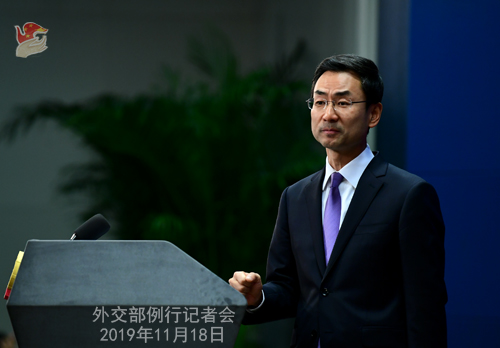 中文
中文
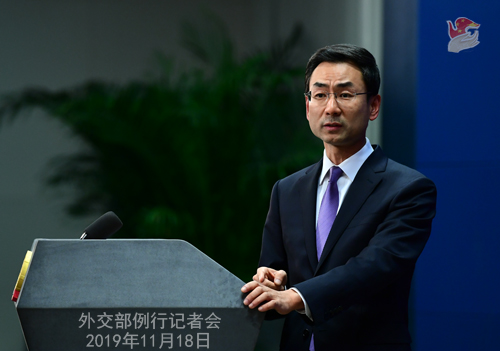
Q: A New York Times report on November 16 claimed that it obtained China's internal documents showing that China is building "internment camps" and conducting major "clampdown" against Muslims in Xinjiang. Do you have any coment on that?
A: We responded many times to Xinjiang-related questions. China's stance and policy is clear and consistent.
Xinjiang affairs are purely China's domestic affairs. The issue Xinjiang faces is not about ethnicity, religion or human rights. Rather, it is about fighting violence, terrorism and separatism. Since 2015, China has released seven white papers on Xinjiang's counter-terrorism and de-radicalization efforts as well as vocational education and training work, which are clear and thorough statements of what happens in Xinjiang.
From 1990 to 2016, thousands of violent and terrorist incidents occurred in Xinjiang, which caused heavy casualties and property losses. Faced with such severe circumstances, Xinjiang lawfully fought those crimes while addressing the root causes and making utmost efforts to protect residents' basic human rights from the harm of terrorism and extremism. Thanks to the preventive counter-terrorism and de-radicalization efforts, Xinjiang, a place that once suffered gravely from terrorism, hasn't seen a single violent, terrorist incident over the past three years. People's right to life, health and development and other basic rights have been effectively safeguarded. The government's measures have been endorsed by all ethnic groups.
China will show no mercy to violent radicals and terrorists, and will spare no effort to protect people's life and safety. Over 1,000 foreign diplomats, international organization officials and media personnel agreed after visiting Xinjiang that the counter-terrorism and de-radicalization efforts there are an important contribution to the world and valuable experience for all to learn from.
The New York Times is completely deaf and blind to all those facts. What's worse, it used clumsy patchwork and distortion to hype up the so-called "internal documents" and smear China's counter-terrorism and de-radicalization efforts. What are they up to?
We will continue to handle our domestic affairs well. We will continue to implement our Xinjiang policy and ensure the region's sound development. The most powerful response to certain media and individuals is Xinjiang's lasting prosperity, stability, ethnic solidarity and social harmony.
Q: Recently Chinese students tore down "pro-Hong Kong protest" posters on university campuses in South Korea. The spokesperson of the Chinese Embassy in the ROK expressed support by saying that what the young Chinese students did is reasonable and understandable. After the spokesperson's statement was released, the Chinese students have continued to tear down those posters. What's your comment?
A: You already noticed the statement of the Chinese Embassy but it seems that you somewhat misinterpreted it.
For a while, overseas Chinese, including Chinese students in South Korea, have expressed in various ways concern over what's happening in Hong Kong, aspiration for Hong Kong's stability and prosperity, and resolve to safeguard China's sovereignty. Here are some points I must make clear:
First, it is totally justifiable and understandable for them to express their indignation and opposition to words and actions that attempt to split the nation and smear China's image.
Second, we also hope overseas Chinese can express their patriotism in a rational way and stay safe.
Third, the Chinese government always asks overseas Chinese to abide by local laws and regulations. At the same time, we hope relevant countries can understand and respect their lawful activities and protect their lawful rights and interests.
At this point, the biggest appeal of the 1.4 billion Chinese people, including the Hong Kong compatriots, is to stop violence, end chaos and restore order. Their biggest aspiration is to uphold Hong Kong's prosperity and stability. This is the common will of 1.4 billion Chinese nationals.
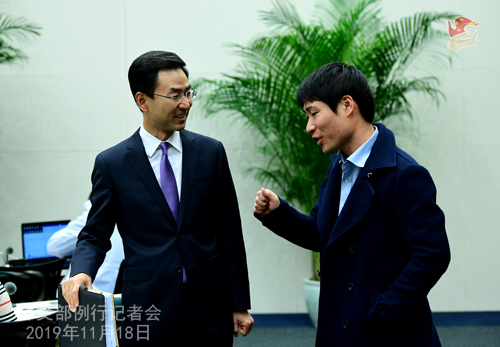
Q: On November 20, the Shinzo Abe administration will become the longest-serving one in Japan's constitutional government. How do you comment on the cabinet's diplomacy? What kind of relations does China hope to build with Japan?
A: I noted what you mentioned. Regarding your first question, the Japanese people are in a better position to give you an answer.
As to China-Japan relations, I want to point out that since last year, under the strong political guidance of the two leaders, our bilateral relations have returned to the right track and maintained sound momentum of development. In June this year, President Xi and Prime Minister Abe held a successful meeting in Osaka, reaching important consensus on building a bilateral relationship in keeping with the demand of a new era. We hope Japan will continue to firmly follow a positive China policy, stay committed to the principles set out in the four political documents, enhance sound interaction, deepen exchange and cooperation across the board, constructively manage and control differences and disputes, and ensure the sustained sound and stable development of China-Japan relations.
Q: China sailed a group of carrier ships into the Taiwan Strait on Sunday. The group was trailed by US and Japanese ships. What is the purpose of this operation and has China been in cooperation or communication with US and Japanese counterparts regarding this exercise?
A: Perhaps you have noticed that the PLA Navy spokesperson already responded to this. I'd refer you to them if you are interested.
But I wonder why is the fuss over a normal and regular exercise of China's fleet at its own doorstep? The relevant activity complies with international law and international practice. We urge relevant sides to stop actions that interfere with China's normal military operations.
Q: You just said that over a thousand diplomats, representatives of international organizations and correspondents have traveled to Xinjiang. With regard to numbers about what is happening in Xinjiang right now, how many people have been placed in centers for education and skills training, how many are currently there and how many have left?
A: Like I said, China has already released seven whitepapers on Xinjiang, all of which provide facts in a clear and thorough manner.
As to the specific question you are interested in, you may need to check with the competent authorities.
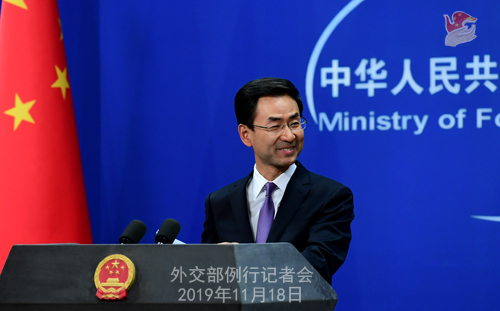
Q: Sri Lanka's Election Commission reportedly announced on November 17 that former Secretary to the Ministry of Defence & Urban Development Gotabaya Rajapaksa won the presidential election. What's your comment?
A: China is pleased to see the successful presidential election and the completion of this major domestic political agenda in Sri Lanka and expresses congratulations to Mr. Gotabaya Rajapaksa.
China and Sri Lanka are strategic cooperative partners with sincere mutual assistance and ever-lasting friendship. On the basis of mutual respect, equality and mutual benefit, China stands ready to work with the new leadership and government of Sri Lanka for high-quality BRI cooperation and greater progress in China-Sri Lanka relations to deliver more tangible benefits to our countries and peoples.
Q: I want to ask a question relating to Hong Kong. Confrontation between protesters and police escalated over the weekend. We also saw that President Xi made his remarks on the issues last week. Does it signal a change in China's stance on Hong Kong?
A: A readout was already released about President Xi's important statement on Hong Kong on November 14. We will firmly follow through on this important statement. For your refernce, the spokespersons of the Hong Kong and Macau Affairs Office of the State Council and the Liaison Office of the Central People's Government (LOCPG) of China in the Hong Kong Special Administration Region also issued statements respectively last Friday.
Here I want to stress that the Chinese government is determined to safeguard national sovereignty, security and development interests, implement the "one country, two systems" policy, and oppose any foreign interference in Hong Kong affairs.
Q: China has frequently called for peace and stability in Hong Kong. But at the moment, it appears that police in Hong Kong are preventing protesters from leaving a university campus, which seems to be prolonging a tense situation. Should the police in Hong Kong allow those students to leave?
A: I don't know if you have been closely following the situation in Hong Kong all along. If you have done so without bias, you should have seen clearly that what's happening in Hong Kong now is far beyond peaceful demonstration. It is simply violence by a handful of extreme violent criminals against civilians. Their disruption to the normal social functioning has put public order in jeopardy. The police in Hong Kong are protecting the life and property of Hong Kong residents and maintaining social order lawfully.
As we said, the most pressing task in Hong Kong is to stop violence and restore order. The central government firmly supports the Hong Kong SAR government led by the Chief Executive in governing Hong Kong in accordance with law, the Hong Kong police in strictly enforcing law, and the Hong Kong judiciary in bringing violent criminals to justice according to law.
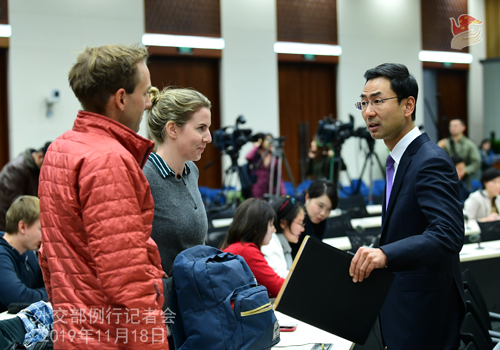
Q: US Secretary of State Pompeo once again attacked China's political system and policies in a speech on November 15. I wonder if you could comment on that?
A: Mr. Pompeo has been repeating the well-worn rhetoric to slander China wherever he goes for quite some time, which reveals nothing but his ideological prejudice and ignorance of China's past and present. Such words are not even worth refuting. As time passes, all his fallacies and lies will be proven untrue.
The Cold War ended almost 30 years ago. However, it seems that the Cold War is still haunting Mr. Pompeo. It's almost like he's cocooned in the ash of history, leaving him insulated from the evolvement of the world, the people's aspiration and the changing times. In this era, it is simply of no use to drive a wedge between countries or to erect a wall of confrontation out of ideological bias and a zero-sum game mindset. Such attempts will get Mr. Pompeo and his like nowhere.
I hope Mr. Pompeo will give up the Cold-War and zero-sum game mindset, stop blabbering about anti-China nonsense and view China and China-US relations in a correct perspective. As the US Secretary of State, he should be doing something good for our bilateral relations befitting his position, instead of what he is doing now.
Q: First question, a report said that some of the UK's telecoms companies have been exploiting the UK government's indecision on Huawei and already began installing Huawei kit across the UK's telecoms sector. Some people are unhappy about this. I wonder what China's comment is? The second question, you criticized earlier the New York Times report on Xinjiang. The New York Times say they used evidence from government documents. I would like to know if China believes what it said is untrue?
A: I'd like to take your second question first. Since 2015, China has issued seven white papers on Xinjiang's counter-terrorism and de-radicalization efforts as well as vocational education and training work, which are thorough statements of what happens in Xinjiang. Thanks to the preventive counter-terrorism and de-radicalization efforts endorsed by all ethnic groups, Xinjiang hasn't seen a single violent, terrorist incident over the past three years. The best response to certain media and individuals is the lasting prosperity, stability, solidarity and harmony in Xinjiang.
Regarding your first question, I'll leave that to Huawei as I'm not aware of the details. But as a spokesperson of the Foreign Ministry, I could say that Huawei, as a private company, has invested over 2 billion pounds in the UK, created more than 20,000 jobs, set up joint research centers and actively fulfilled its social responsibilities during years of operation in Britain. I hope the UK will make an objective, fair and independent choice that serves its interests, and foster a business environment that is open, fair, just and non-discriminatory for Chinese companies, which I believe will keep up their confidence in investing in Britain.
Q: Is China concerned at all that the New York Times report will lead to more criticism from politicians overseas?
A: As I clearly stated, the best response to ill-intentional slanders by some media, individuals and anti-China forces is the lasting prosperity, stability, solidarity and harmony in Xinjiang.
Q: You mentioned slanders and rumors. Are you referring to the New York Times' recent report being not authentic?
A: As I said, the New York Times remains deaf and blind to facts while smearing China's counter-terrorism and de-radicalization efforts in Xinjiang with so-called "internal documents". What are they up to?
I believe the best response to this is Xinjiang's lasting prosperity, stability, solidarity and harmony.
Q: Another question on Hong Kong. There are a lot of concerns that the police in Hong Kong are going to use live rounds. There have been reports already of their use in recent days. A top US official at the weekend condemned the "unjustified use of force" in Hong Kong. Does China have a comment on that?
A: I'd like to reiterate that the central government firmly supports the Hong Kong SAR government led by the Chief Executive in governing Hong Kong in accordance with law, the Hong Kong police in strictly enforcing law, and the Hong Kong judiciary in bringing violent criminals to justice according to law.
As for some people's slanders against Hong Kong, I'd like to remind them that Hong Kong is part of China and Hong Kong affairs are China's domestic affairs. We resolutely oppose any interference by foreign governments, organizations or individuals. No one should underestimate the Chinese people's firm determination to defend national sovereignty and security as well as Hong Kong's prosperity and stability.
